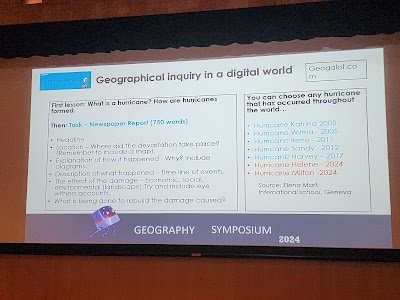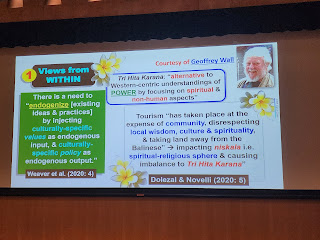Love the Geography symposium as the fraternity came together to share good practices. Learning of geography allows students to see the world through the geographical lens, developing observation skills, analysing trends, and understanding world issues.
So honoured to hear from the Keynote speaker, Mrs Margaret Roberts, author of Geography through enquiry.
Last attended her workshop on geographical inquiry in 2010. The workshop influenced me in putting up questions with the photos or videos with the link to the source on my geographical issues update (olevelgeog.blogspot.com) rather than just information on the blog. It is essential to sparkle the students' curiosity and this will get them started to think more deeply into the issues and ask more questions.
https://geogshare.blogspot.com/2012/06/geographical-inquiry-june-2010.html?m=1
https://www.geogalot.com/
Session 1 Workshop 1.2
How can the study of tourism nurture students to be sustainability-minded global citizens?
Presented by Cheri Nur Aini, Anis Fazerina Mohamad Ibrahim, Filzah Nadiah Zainal Abidin, Josephine Mary Saminathan and David Chin from Presbyterian High School
Love how the team worked towards getting the students to be more engaged and deepen their understanding via role play using circle time on the topic of Sustainable Tourism.
A great way to integrate 21CC learning.
Session 2: Workshop 2.1
Geography through Enquiry: How can Climate Change Mitigation be Investigated in the Geography classroom?
Presented by Ms Margaret Roberts
The workshop addressed the following questions:
How can we spark curiosity and get students involved?
What is the evidence on the future potential of different mitigation options? (using data from COP28)
What are the social, economic, environmental and political challenges and implications of some of the mitigation options? (reference to specific case studies)
In this workshop, participants will be actively engaged, using and evaluating classroom activities. Although the activities aim to increase knowledge and understanding of climate change mitigation, they can be adapted and applied to other topics in the syllabus and their associated resources.
The activities, as well as using an inquiry approach, are designed to develop 21st century competencies, including collaborative team work, communication and presentation skills, critical thinking and futures thinking as global citizens.
Getting the participants/students to ask more questions based on assessment given question (fertile question)
When students are more involved in the construction of knowledge, it stays longer in them.
Knowledge construction occurs when learners actively build their understanding of a topic or concept through exploration, reflection, and interaction. It involves constructing meaning from the information and experiences gained through learning activities.
https://sites.google.com/moe.edu.sg/gem/geography-symposium-2024/concurrent-sessions?authuser=0
Keynote speaker Professor TC Chang
Critical thinking and Adaptive thinking.
Not just as recipient of knowledge but active agent of knowledge.


































































No comments:
Post a Comment